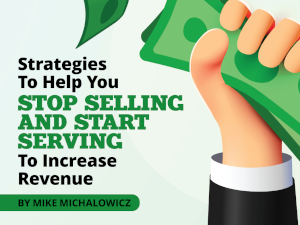 During a time when people are buying less, you still need to create sales and build profitability in your business. The problem? No one likes sales calls. No one likes to make them, and few enjoy receiving them.
During a time when people are buying less, you still need to create sales and build profitability in your business. The problem? No one likes sales calls. No one likes to make them, and few enjoy receiving them.
The process of selling can be intimidating and carries with it a negative stereotype—the main one being soliciting and manipulating prospects to buy something they don’t need. When approaching sales, people tend to think they have to be so persuasive they end up on the border of manipulation.
WHAT IF YOU COULD CHANGE THE WAY YOU SELL, RESULTING IN MORE SALES?
Increasing sales in your small business is going to require a refresh. Here are three simple ways to reboot your sales strategies for results that everyone can feel good about:
1. REFRAME YOUR SALES MINDSET.
Before anything else, you must start elevating your sales techniques by flipping the script from selling to your customers to serving your customers.
Once you make this small but powerful change, your sales will occur more organically. If you know that your offering will improve their life, you have a responsibility to get it in their hands. That’s being of service. Now let’s talk about implementing that mindset into the sales process.
2. ELEVATE YOUR SALES SKILLS AND COMMUNICATION.
Your sales call may be your first impression. Your customers may not yet know you and, ultimately, won’t understand the full benefit of your service until they buy from you. Their introduction to you—that first impression—will be based on how you’re selling to them. How you communicate with prospects will influence their decision whether or not to become your customers.
The first step is to begin making service calls and stop making sales calls. If you’re simply calling to be of service, it changes everything. During the sales process, consumers will be asking themselves if they trust you and if you’re offering something to genuinely help them. Service over sales will gain that trust.
Now that you’re coming from a place of service, it’s important to carry over that mindfulness to your sales communication. Everything you say in your sales communication will build your customer relationships and business reputation.
- Listen first. The most effective communication is born from listening. This takes active practice and requires less thinking about a response while someone else is speaking. Make sure your potential customers feel heard and that you understand their needs. Let them speak and then . . .
- Ask questions. Questions show you’ve intently listened, are engaged in the conversation, and are interested in thoroughly covering all of the requirements your prospect may have.
- Then offer. Your offer should be less about sales and more about informing and educating what your product is and how it will solve a customer’s problem. Upgrade the conversation by eliminating the old sales phrases that don’t sound integral. Ask if they would like your assistance. If they say yes, then you may proceed with closing the sale.
Your potential customers need to feel their concerns are understood and that you are the trusted expert that can give them a solution to their needs. Illustrate that their well-being is more of a concern than the sale. Have a sincere discussion to determine what your prospect needs and explain how you can serve them now.
Conversely, if you feel you may not have the solution they require, be honest about it not being a fit for them at the moment. This transparency will give you a trustworthy business reputation, create stronger customer relationships, and ensure customer loyalty.
3. AUDIT YOUR SALES PROCESS AND CONSUMER JOURNEY.
When you make a sale, that’s only the beginning, not the end. Your customer needs to feel confident in their decision to work with you from start to finish. This means every financial transaction, email, phone call, and delivery date needs to be met with continued, thoughtful service and zero friction.
While your customer is waiting for their product to be delivered, be sure to stay in communication if there are any changes along the way. And, after the deliverable is met, follow up with them to let them know you care about how it served them and if they require anything more
Your customers’ experience with your entire sales process determines not only if they become loyal customers but if others do too. While you don’t want to rely on word of mouth for future sales, you must also remember that reviews and conversations about customer experiences will directly affect your future sales
Your reputation is only as good as the action you take. How you serve is everything. Be of service.
Mike Michalowicz, is the entrepreneur behind three multi-million-dollar companies and is the author of several business books, including Profit First, Clockwork, The Pumpkin Plan and his newest book, All In. Mike is a former small business columnist for The Wall Street Journal and business makeover expert for MSNBC. He regularly travels the globe as an entrepreneurial advocate.




